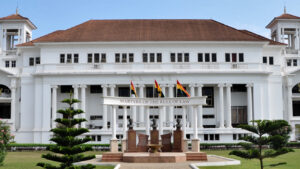Ghana Faces Extended ‘Dumsor’; Resolution May Take Up to Two Years – IES

IES has raised serious concerns about the ongoing energy crisis in Ghana, warning that the country could continue to face power outages, locally known as “dumsor,” for up to two more years. Nana Amoasi VII, the Executive Director of IES, shared this grim prediction during an interview on Joy FM’s Super Morning Show on Monday, November 25. Amoasi explained that the persistent power cuts in the country are largely due to significant inefficiencies within the energy distribution system, particularly within the Electricity Company of Ghana (ECG), which he says has failed to modernize its operations and resolve longstanding issues.
Amoasi’s warning underscores the severity of the energy crisis and its prolonged nature, highlighting the fact that stability in the power sector is unlikely to be achieved in the immediate future. He emphasized that the energy sector in Ghana is facing deep structural issues that have been ignored for years, resulting in recurring power outages that continue to affect homes, businesses, and industries. “We are not moving out of dumsor anytime soon. It could take up to two years before we see any stability in the power sector,” Nana Amoasi said, indicating that significant changes will be needed for the energy system to recover.
Amoasi pointed out that one of the key contributing factors to the crisis is the outdated and poorly maintained meters across the country, particularly those managed by the Electricity Company of Ghana (ECG). He revealed that some of the meters have not been serviced or recharged in over a year, which exacerbates the already inefficient system. According to Amoasi, as long as these issues with meter management and distribution inefficiencies persist, the country will continue to experience intermittent power outages. “As long as ECG remains inefficient, with meters failing to function properly, dumsor will continue,” he stated, calling for urgent reforms within ECG to ensure that the country’s energy system becomes more reliable.
The IES Executive Director also criticized the government for missing critical opportunities to address the root causes of dumsor. He pointed to investments that could have been made in 2018 and 2019, which would have helped resolve many of the inefficiencies currently plaguing the energy sector. Amoasi specifically mentioned that a relatively modest investment of 22 million Ghana cedis during these years could have gone a long way in upgrading the infrastructure and resolving key issues in the power sector. “After 2017, the government inherited a strong power sector with adequate installed capacity and reliable fuel supply. Dumsor should not have resurfaced,” he lamented, suggesting that the government had the means to prevent the current crisis but failed to take the necessary steps.
Another area where Nana Amoasi expressed concern was the lack of transparency within the energy sector, particularly when it comes to data management by GRIDCo, the organization responsible for managing the national electricity grid. He claimed that critical data regarding the operations and performance of the national grid is being withheld from the public, raising questions about the transparency of the government’s handling of the energy sector. “If you try to access a sheet from GRIDCo today, it’s labeled ‘private and confidential’ – why is the government suppressing vital information?” Amoasi asked, suggesting that greater openness and public access to this information could foster accountability and lead to more informed decisions about the energy sector’s future.
Amoasi also called for a more disciplined approach to energy infrastructure investment. He stressed that proper funding and targeted investments are necessary to address the systemic inefficiencies in the power sector. This, he believes, would help improve the performance of the country’s power utilities and reduce the frequency of power outages. In addition to this, he proposed that the government should adopt more equitable revenue distribution mechanisms, ensuring that the funds allocated for energy sector improvements are used effectively and reach the areas where they are needed most.
Nana Amoasi’s comments paint a bleak picture for the future of Ghana’s energy sector. Despite the challenges, he emphasized that resolving the energy crisis will require long-term strategic investments, structural reforms, and greater transparency within the sector. Without these efforts, Ghana will continue to struggle with the issue of dumsor, which could persist for up to two more years, according to IES. As the country grapples with these challenges, it is clear that a significant overhaul of the energy distribution system is needed to provide the stability and reliability that Ghanaians expect and deserve.






